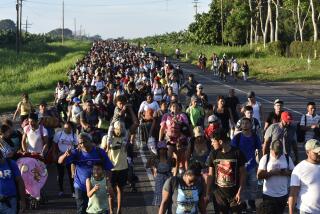Mexican army frees 165 immigrants held at gunpoint
MEXICO CITY — The Mexican army freed 165 immigrants from an armed gang that had kidnapped them as they attempted to make their way to the United States, authorities announced Thursday.
The migrants, mostly from Central America, were being held at gunpoint inside a small building in a part of Mexico’s northern border state of Tamaulipas that is controlled by the notorious Zetas drug and smuggling cartel.
Twenty children and teens and two pregnant women were among the victims, Eduardo Sanchez, the government’s security spokesman, said in a presentation to journalists in Mexico City. As has become customary with the government of President Enrique Peña Nieto, Sanchez took no questions.
He said the migrants told authorities they had been “held against their will” in filthy, overcrowded conditions for two or three weeks. Most had been intercepted when they attempted to reach the northern border and cross into the United States, and their captors telephoned their families to demand ransom money, Sanchez said.
It is the increasingly typical plight of Central Americans attempting to traverse Mexico to the United States. Mexico’s national human rights commission estimates about 10,000 migrants have gone missing each year since 2008 — kidnapped for ransom, shanghaied into forced labor for drug traffickers or killed. Many are killed when their families can’t pay ransoms.
Mexican authorities occasionally discover where migrants are being held and free them, although this group was one of the largest. The army, acting on an anonymous tip, went to the building in the town of Diaz Ordaz in Tamaulipas, spied a well-armed guard and found the migrants cowering inside amid soiled blankets and overturned plastic furniture, Sanchez said.
The group was found Tuesday, and the government announced it Thursday. One suspect — presumably the armed guard — was arrested.
“Everything seems to indicate that these people, the migrants, are contacted by people — smugglers, commonly known as polleros — and that the smugglers, these criminals, instead of taking the migrants to the border as offered, hand them over to criminal groups” such as the Zetas, Sanchez said.
The group consisted of one person from India, as well as 77 Salvadorans, 50 Guatemalans, 23 Hondurans and 14 Mexicans, he said. The pregnant women were a Salvadoran and a Honduran.
All were transported to a migration center and received medical care, Sanchez said. They will probably eventually face deportation.
ALSO:
Mexico’s Vicente Fox says he would grow marijuana if legalized
Latin American countries push for alternatives in drug war
With China’s Xi visiting, Mexico hopes to build better ties
More to Read
Sign up for Essential California
The most important California stories and recommendations in your inbox every morning.
You may occasionally receive promotional content from the Los Angeles Times.











